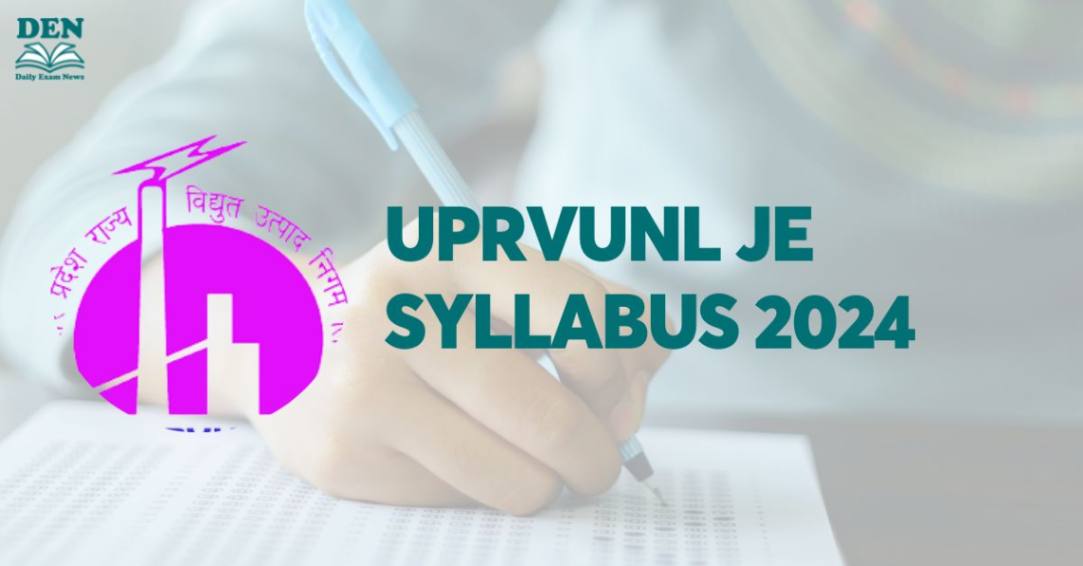The Uttar Pradesh Rajya Vidyut Utpadan Nigam Limited (UPRVUNL) will shortly issue the UPRVUNL JE syllabus 2024 and test pattern for the Junior Engineer (JE) exam. Candidates must be well-versed in the comprehensive UPRVUNL JE 2022 Recruitment syllabus in order to cover all of the disciplines and topics required to achieve the highest possible score in the examination. According to the UPRVUNL JE Syllabus, the subjects expected to be covered in the exam are General Awareness, Hindi, Reasoning, Civil Engineering, Electrical Engineering, Mechanical Engineering, Electronics & Communication Engineering, Instrumentation Engineering, and Computer Science Engineering. This page contains further information about subject-specific subjects, marking schemes, bad marks, and outstanding books.
UPRVUNL JE Syllabus 2024 (Expected)
The UPRVUNL JE syllabus for 2024 has yet to be made available on the university’s official website. To achieve the greatest possible mark, all candidates must follow the UPRVUNL JE syllabus 2024 during their exam preparations. Only applicants who score more than the UPRVUNL JE Cut Off marks in the CBT will advance to the interview round. The syllabus for this written examination is as follows.
| Subject | Syllabus |
| General Awareness | Current Affairs – National & International |
| Uttar Pradesh GK | |
| Indian Geography | |
| History – India & World | |
| Indian Politics | |
| Science & Technology | |
| Indian Constitution | |
| Indian Economy | |
| Environmental Issues etc. | |
| Hindi | Vocabulary |
| Grammar | |
| Translation of Sentences | |
| Usage of Words | |
| Parts of Speech | |
| Comprehension | |
| Fill in the blanks etc. | |
| Reasoning | Cubes and Dice |
| Mirror Images | |
| Embedded Figures | |
| Non-Verbal Series | |
| Alphabet Series | |
| Number Ranking | |
| Arithmetical Reasoning | |
| Clocks & Calendars | |
| Blood Relations | |
| Analogy | |
| Decision Making | |
| Directions | |
| Coding-Decoding | |
| Number Series | |
| Mechanical Engineering | Material Science and Metallurgy |
| Production Technology | |
| Automotive Engines | |
| Thermodynamics | |
| Engineering Mechanics | |
| Strength of Materials and Design | |
| Heat Transfer etc. | |
| Theory of Machines | |
| Forming Processes | |
| Operations | |
| Engineering Materials | |
| Electrical Engineering | C Fundamentals |
| Utilization of Electrical Energy | |
| Power Systems | |
| Power Electronics & Drives | |
| Network Theory | |
| Electrical Machines | |
| Basic Electrical Engineering Concepts | |
| Analog and Digital Electronics | |
| Magnetic Circuit | |
| Estimation and costing | |
| Measurement and measuring instruments | |
| Basic Electronics etc. | |
| Electronics & Communication Engineering | Basics of Circuits and Measurement Systems |
| Analog Electronics | |
| Transducers, Mechanical Measurement and Industrial Instrumentation | |
| Electrical and Electronic Measurements | |
| Digital Electronics | |
| Control Systems and Process Control | |
| Analytical, Optical Instrumentation | |
| Signals, Systems, and Communication | |
| Civil Engineering | Engineering Mechanics |
| Engineering Materials & Constructions | |
| Surveying & Measurement | |
| Mechanics of Solids | |
| Transport Phenomenon | |
| Engineering Economy & Management | |
| Elementary Engineering | |
| Energy Conversion | |
| Environmental Engineering | |
| Structural Analysis | |
| Structural Design | |
| Hydrology & Water Resources | |
| Soil Mechanics & Foundations | |
| Design of Hydraulic Structures | |
| Open Channel Flow | |
| Transportation Engineering | |
| Hydraulic Engineering | |
| Public Health Engineering | |
| Instrumentation Engineering | Analog Electronics |
| Biomedical Instrumentation | |
| Analytical Instrumentation | |
| Basics of Circuits and Measurement Systems | |
| Control Systems and Process Control | |
| Industrial Instrumentation | |
| Digital Electronics | |
| Systems and Communications | |
| Optical Instrumentation | |
| Mechanical Measurement | |
| Electrical and Electronics Measurements | |
| Signals | |
| Transducers | |
| Computer Science Engineering | Data Communication and Networks |
| Computer Fundamentals and Programming | |
| Operating System | |
| Relational Database Management System | |
| Cyber Law in India | |
| Linux System Administration | |
| Information and Network Security |
UPRVUNL JE Exam Pattern 2024 (Expected)
The UPRVUNL JE Exam Pattern is given in the table below. Knowing the exam pattern and mark distribution is extremely significant because it allows aspirants to prepare for the exam objectively and precisely. It is useful to know which pieces carry more weight and so require more attention. The Marking Scheme is as follows:
- For every correct answer, 1 mark would be given.
- There will be a negative marking of 0.25 mark for every wrong answer.
| UPRVUNL JE Exam Pattern 2024 (Expected) | ||||
| Part | Subject | Questions | Marks | Duration |
| Part 1 | Relevant Diploma Stream | 150 | 150 | 3 hours |
| Part 2 | General Hindi | 50 | 50 | |
| General Knowledge | ||||
| Reasoning | ||||
| Total | 200 | 200 | ||
Check here for more information-
Hopefully, this information was useful for all the aspiring candidates preparing for the government exams. Check DailyExamNews to stay informed about the latest recruitments, tests, vacancies, and developments regarding government exams.

